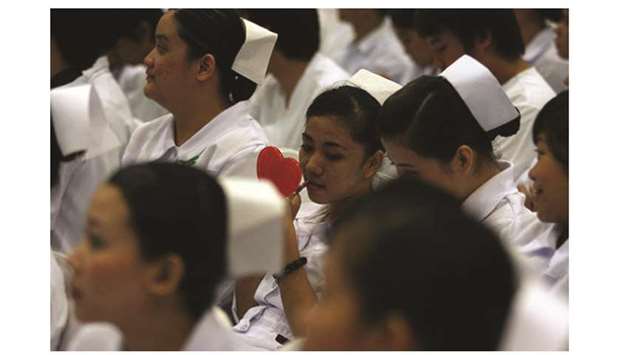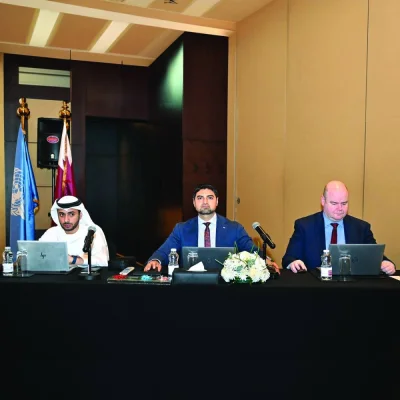Faith Makilan was supposed to start a new job as a nurse in a hospital in Germany at the end of March, but the coronavirus pandemic has left her stranded in her home town in the central Philippines.
The 29-year-old has no idea when she can travel and is beginning to worry whether the job in Heidelberg will still be available once she can.
Aside from a lockdown in the capital, which has closed all non-essential public offices and services, and entry restrictions in other countries, the Philippine government has also imposed a temporary ban on the deployment of health care workers abroad.
“It’s very depressing, stressful and frustrating,” said Makilan, speaking from her home in Moises Padilla town in Negros Occidental province, 522 kilometres south of Manila.
“I have been working on my deployment for one year now, processing papers, studying the language, and then the government is saying you are banned from leaving,” she added.
Makilan is just one of hundreds of Filipino nurses stranded by a temporary deployment ban issued by the Philippine Overseas Employment Agency (POEA) on April 2.
The ban exempts healthcare workers with existing contracts or just returning from their holidays.
Yet Makilan said she has been unable to process an overseas employment certificate (OEC) — a required document that can only be issued by the POEA.
“They told us there is a shortage of healthcare workers in the country, so we should be on standby and in the meantime, they want us to volunteer,” Makilan said.
“It’s really bad for people like me,” she added. “We just want to earn for our family and improve our career as nurses. We also deserve more.”
For decades, Filipino nurses have been migrating abroad to meet high demand elsewhere.
The POEA estimates more than 13,000 healthcare professionals, mostly nurses and nursing assistants, leave the country every year.
Due to this exodus, the country faces a shortage of 290,000 healthcare workers, the agency said.
This shortage has become ever more acute in light of the pandemic, not least because healthcare workers have made up 20% of more than 12,000 confirmed coronavirus cases and at least 35 deaths.
At the start of the crisis in March, the Department of Health launched an appeal for volunteers to work for a measly allowance of 500 pesos ($10) per eight-hour shift, to the outrage of many healthcare workers. The department has since apologised and revamped its programme to focus on emergency hiring instead.
Mikee Santos, head nurse at one of the top hospitals in Manila, said nurses who stay in the country should be given a salary increase during the pandemic.
“This is the time that they should appreciate that we stayed here in the Philippines, we are their partners in the fight during this crisis,” he said.
Santos, a practising nurse for the past 13 years, said he also once considered working abroad after being offered a salary three times what he could earn in the Philippines.
“I had an application but because I needed to take care of my mum, I had no choice but to stay,” he said.
Marion Gerald Mangalindan, a 32-year-old nurse working in Britain for the past three years, lamented that public perception has not been favourable to his profession in the Philippines before the pandemic. “You don’t have to make us heroes,” he said from his home in Manila, where he had been on leave when the government imposed a lockdown.
“But appreciate the work we do, what it means to be us.”
“Give us what is proper, what we deserve,” he added, noting that in some instances nurses can earn as little as 8,000 pesos ($160) a month.
Mangalindan was scheduled to return to work at the end of March, but his flight was cancelled due to the pandemic.
He is worried that he could lose his job, especially if the government decides to extend the ban on healthcare workers taking jobs overseas.
President Rodrigo Duterte has called for a review of nurses’ overseas deployment, based on what he has said is concern for their safety.
Dozens of Filipino nurses and healthcare workers have died in Britain and other countries while helping to look after Covid-19 patients.
“Please do not misunderstand me,” Duterte said. “I do not want you to go there and come back in a coffin. You are Filipinos and I love all my fellow Filipinos.”
But Mangalindan said that while he and his colleagues understood the president’s concern, they were aware of the risks.
“We understand that there is a pandemic, but every person should be given the liberty to choose their actions and to be accountable for the consequences of their actions,” Mangalindan said.
International / ASEAN/Philippines
Filipino nurses frustrated by ban on working abroad during pandemic

For decades, Filipino nurses have been migrating abroad to meet high demand elsewhere.


